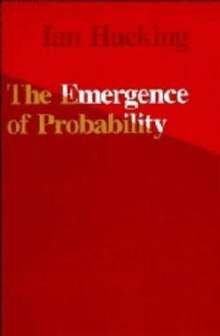The Emergence of Probability
The Emergence of Probability: A Philosophical Study of Early Ideas about Probability, Induction and Statistical Inference (1975; second edition 2006) is a book about the history of probability by the philosopher Ian Hacking.
 Cover of the first edition | |
| Author | Ian Hacking |
|---|---|
| Country | United Kingdom |
| Language | English |
| Series | Cambridge Series on Statistical & Probabilistic Mathematics |
| Subject | History of probability |
| Publisher | Cambridge University Press |
Publication date | 1975 |
| Media type | Print (Hardcover and Paperback) |
| ISBN | 978-0521685573 |
Summary
Hacking discusses the history of probability.[1]. Here is a quote from page 17 of the book, which describes the basic model the author uses to try to understand probability: It is better to expose the crudities of one’s model at the start, than to conceal a methodology in banal phrases. I am inviting the reader to imagine, first of all, that there is a space of possible theories about probability that has been rather constant from 1660 to the present. Secondly, this space resulted from a transformation upon some quite different conceptual structure. Thirdly, some characteristics of that prior structure, themselves quite forgotten, have impressed themselves on our present scheme of thought. Fourth: perhaps an understanding of our space and its preconditions can liberate us from the cycle of probability theories that has trapped us for so long. This last feature has a familiar ring. The picture is, formally, the same as the one used by the psychoanalysts and by the English philosophers of language. ‘Events preserved in memory only below the level of consciousness’, ‘rules of language that lie deep below the surface’, and ‘a conceptual space determined by forgotten preconditions’: all three have, of course, a common ancestor in Hegel. I do not ask any reader to swallow all this. The story told in what follows is of interest even if the methodology that led to it turns out to be silly. I state the picture partly to explain how some of the data have been selected.
The author argues that there was a sudden and dramatic transition in the conception of probability in the mid seventeenth century, which led to modern concepts of probability. He also explains that he is making use of Foucault's archaeology of knowledge to study the historical development and change in the ideas of probability.
Publication history
The Emergence of Probability was first published by Cambridge University Press in 1975. A second edition was published in 2006.[2]
Reception
The Emergence of Probability has been described as ground-breaking.[3]
The philosopher James Franklin argued that Hacking's contention that there was no concept of uncertain evidence before about 1650 is incorrect, as it neglects the extensive Latin scholastic literature on legal evidence and aleatory contracts and on induction.[4]
See also
References
- Hacking 2006, pp. 1–186.
- Hacking 2006, p. iv.
- Macintosh 2005, p. 357.
- Franklin 2001, p. 373.
Bibliography
- Books
- Franklin, James (2001). The Science of Conjecture: Evidence and Probability Before Pascal. Baltimore: Johns Hopkins University Press. ISBN 0-8018-6569-7.CS1 maint: ref=harv (link)
- Hacking, Ian (2006). The Emergence of Probability: A Philosophical Study of Early Ideas About Probability Induction and Statistical Inference. Cambridge: Cambridge University Press. ISBN 978-0521685573.CS1 maint: ref=harv (link)
- Macintosh, Jack (2005). "Hacking, Ian". In Honderich, Ted (ed.). The Oxford Companion to Philosophy, Second Edition. Oxford: Oxford University Press. ISBN 0-19-926479-1.CS1 maint: ref=harv (link)